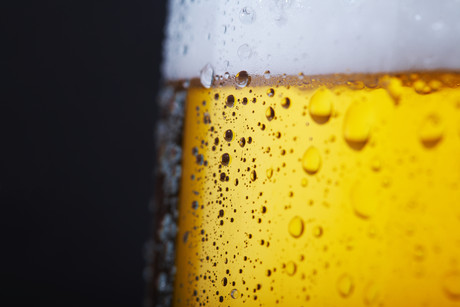Lunar beer

Can beer be brewed on the moon?
The new ‘Space Race’ is on. The Google Lunar XPRIZE is a $30 million competition challenging privately funded teams to develop low-cost methods of robotic space exploration. Among the five finalist teams is TeamIndus, the only Indian team in the competition. Wanting one ‘youth’ experiment on board its spacecraft, TeamIndus invited under-25-year-olds to design and build an experiment that will help establish sustainable life on the moon.
With typical under-25-year-olds’ priorities, a team of UC San Diego engineering students, self-titled ‘Team Original Gravity’, has proposed looking at the viability of brewing beer on the moon. Actually, they are not only interested in brewing beer — their experiment will test the viability of yeast on the moon (and brew a batch of beer).
Understanding how yeast behaves on the moon isn’t just important for brewing beer in space. It’s also important for the development of pharmaceuticals and yeast-containing foods, like bread.
“The idea started out with a few laughs amongst a group of friends,” said Neeki Ashari, a fifth-year bioengineering student at UC San Diego and the team’s PR & operations lead. “We all appreciate the craft of beer, and some of us own our own home-brewing kits. When we heard that there was an opportunity to design an experiment that would go up on India’s moon lander, we thought we could combine our hobby with the competition by focusing on the viability of yeast in outer space.”
The team designed a unique system to accomplish this task.
First, the experiment does not brew the wort — all of the prep work required before yeast is added will be done on Earth, rather than in the experimentation vessel. Then, rather than separating the fermentation and carbonation phases — as would normally occur during the process of making beer — the team plans to combine them. This has eliminated the need for releasing accumulated CO2 and bypassed the associated sanitation and safety issues. It also prevents the possibility of overpressurisation if anything in the system fails and makes the system easier to design.
The testing of fermentation and yeast viability will be done via pressure, rather than using density measurements as done on Earth. This is because density measurements use gravity.
“Converting the pressure build-up to fermentation progress is straightforward, as long as volume and original gravity — specific gravity before fermentation, hence our name — are known prior to the experiment,” said Han Ling, a fifth-year bioengineering undergraduate and the team’s brewing lead.
Whether or not Team Original Gravity is successful in its bid to win a place on the TeamIndus spacecraft will be revealed in March, when proposed experiments for the competition ranging from photosynthesis to electricity will be evaluated by an international jury.
If UC San Diego’s Team Original Gravity is selected, not only will they be the first to brew beer in outer space, the students believe they’ll be the first to brew beer in a fermentation vessel the size of a soft drink can.

“Our canister is designed based on actual fermenters,” said Srivaths Kaylan, a fourth-year nanoengineering major and mechanical lead for the team. “It contains three compartments — the top will be filled with the unfermented beer and the second will contain the yeast. When the rover lands on the moon with our experiment, a valve will open between the two compartments, allowing the two to mix. When the yeast has done its job, a second valve opens and the yeast sink to the bottom and separate from the now fermented beer.”
Siddhesh Naik, TeamIndus ninja and mentor to Original Gravity, said, “The yeast study is among the coolest experiments to be performed on the lunar surface, and I am sure they are one of the top contenders to win the Lab2Moon competition. Original Gravity is one of the most hardworking teams and very dedicated to their project.”
Are we seeing a structural shift in orange juice production?
Orange juice producers around the world face numerous challenges, including issues around supply...
Carlsberg Bulgaria installs filling technology for its canning line
For the first time ever, Carlsberg Bulgaria is canning its own beer — thanks to technology...
Guarding our seafood against vibrio parahaemolyticus
As the global appetite for seafood grows, concerns over pathogen contamination have intensified,...











